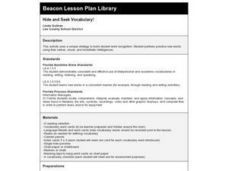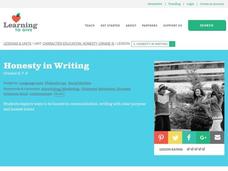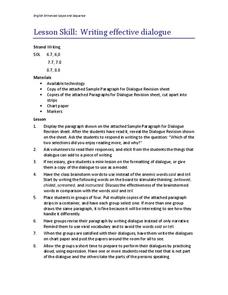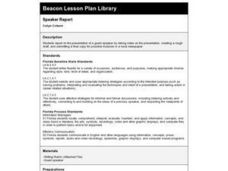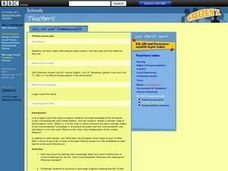NOAA
Ocean Exploration
Where am I? The second installment of a 23-part NOAA Enrichment in Marine sciences and Oceanography (NEMO) program starts with pupils guessing the years in which major ocean exploration events took place. The lesson then focuses on how...
EngageNY
Designing Your Own Game
Your classes become video game designers for a day! They utilize their matrices, vectors, and transformation skills to create and design their own game images. The complex task requires learners to apply multiple concepts to create their...
Administrative Office of the US Courts
Hazelwood v. Kuhlmeier
Freedom of speech is not always free. Scholars investigate how the First Amendment provides for the right to express opinions. Through the court case Hazelwood v. Kuhlmeier, they analyze free speech using primary documents—and hopefully...
US Institute of Peace
Becoming a Peacebuilder
"Be the change you wish to see in the world!" The 15th and final lesson in a peacebuilding series uses this quote from Gandhi to prepare pupils for their own action projects. Individuals research a global issue, then brainstorm a method...
Curated OER
Life of a Logger
Pupils are introduced to the work and lives of 19th century lumberjacks through a living history slide show presentation. They compare and contrast life 150 years ago with the present. Students describe the history of logging in...
Curated OER
What is Communication
Students recognize the process of communication. In this communication activity, students work in pairs and interview each other. Students report on their two minute interview. Students participate in an activity where students must...
Curated OER
The Human Body: Five Types of Human Cells
Students explore the human body by completing a graphic organizer. For this living cells lesson, students analyze a human body cell's chart and discuss the parts of a cell and what they do for our bodies. Students complete a graphic...
Curated OER
Listening Positions, Please
Fourth graders practice using effective listening skills as they listen to oral poetry readings.
Curated OER
Hide and Seek Vocabulary!
Third graders practice word recognition and vocabulary building. They find word cards in the classroom. Then they practice reading the words and using them in sentences. Additional practice is gained by writing the words and using them...
Curated OER
Recognizing How Another Culture Differs From One's Own
Young scholars determine what it means to be on time. In this cultural comparisons instructional activity, students compare the notion of punctuality between the United States and Guinea. Young scholars read "Being on Time," by Kimberly...
Curated OER
School Advisory Panel
How would you choose three high schoolers from your class to be on a school panel that would represent a fair and representative view of opinions? This brief activity offers four different sampling methods to choose from and asks for...
Curated OER
Honesty in Writing
Help your class construct an honest and clear writing piece. They explore tactics in advertising and identify deceptive language. They then write a statement about a community issue using honest language.
Curated OER
Hire the Best Unit
Students complete a activities to improve their career awareness. In this career awareness lesson, students complete a 41 page packet of activities to learn how education can increase earning power, learn about employer attitudes and...
Curated OER
Highway of Words
The punctuation police are here! Dress up as a police officer, and teach your young learners the importance of using correct punctuation. Two poorly written paragraphs are presented to the learners, and they have to correct the errors in...
Curated OER
Teach Peace Now
Help your learners discover empathy and understanding by investigating two sides of a situation. In this humanities instructional activity, pupils examine different pairs of shoes and hypothesize about who may have worn them. Discuss...
Curated OER
Ocean Animals
Very young learners identify ocean animal pictures by their correct name and create a book of ocean animals. They read books and lean ocean animal vocabulary using the SMART Board. A well-designed lesson plan!
Curated OER
Narrative Writing
A basic instructional activity on personal narrative writing is here for you. In it, learners are asked to imagine they're going to share an experience of their own with someone who did not participate in that experience. They verbally...
Virginia Department of Education
Writing Effective Dialogue
Spend a productive hour in the classroom with this tutorial where junior high writers discover how to create snappy dialogue. The learning begins with an analysis of sample writing and discussion on the effectiveness of each piece. The...
Houghton Mifflin Harcourt
Nature: Friend and Foe: Challenge Activities (Theme 6)
The teacher doesn't always have to be the expert in the classroom. The first in a series of three supplementary activities Nature: Friend or Foe uses hands-on research tasks and projects to enhance readers' understanding of non-fiction...
Curated OER
Canadian Social Trends
Students use surveys to explore how to design graphs, tables, and diagrams. They discuss articles which can stimulate ideas for research topics, or surveys of their own.
Curated OER
Speaker Report
Fifth through eighth graders think of themselves as newspaper reporters as they listen to a presentation by a guest speaker. As reporters, they take notes during the presentation. Using these notes, they create a rough draft and then a...
BBC
Eu, Un, and Commonwealth: Keeping Peace
What are the UN, the EU, and Commonwealth? Have the class brainstorm all they know about these powerful international organizations. Then have them compare and contrast the ways in which different countries or political groups work. They...
Curated OER
Angry Feelings (Responsible Personal Conduct)
Students review proper classroom behavior and anger management techniques.
Curated OER
This is My Neighborhood
Students predict the things that they may see, smell, or hear in their neighborhood. They take part in a neighborhood walk, creating a rough map of their neighborhood as they go. Upon return to the classroom, students create a final map...










